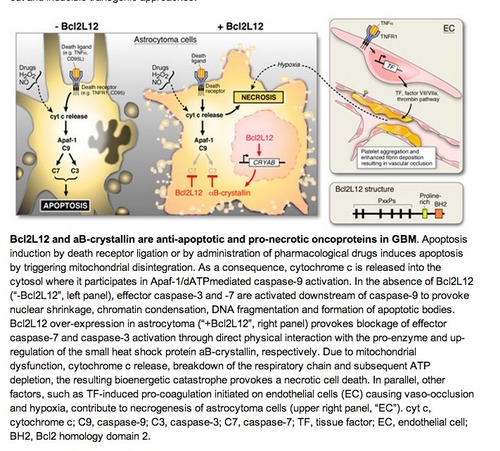See on Scoop.it – Amazing Science
Scientists at Northwestern University say they were able to demonstrate the successful delivery of a drug that turns off a critical gene in glioblastoma multiforme (GBM), increasing survival rates significantly in animals with the deadly disease. This form of brain cancer, which ended Sen. Edward Kennedy’s life, kills approximately 13,000 Americans a year.
According to the investigators, the novel therapeutic, which is based on nanotechnology, is small and nimble enough to cross the blood-brain barrier and get to where it is needed—the brain tumor.
Designed to target a specific cancer-causing gene in cells, the drug flips the switch of the oncogene to “off,” silencing the gene, they added. This knocks out the proteins that keep cancer cells immortal.
In a study of mice (“Spherical Nucleic Acid Nanoparticle Conjugates as an RNAi-Based Therapy for Glioblastoma”), the nontoxic drug was delivered by intravenous injection. In animals with GBM, the survival rate increased nearly 20%, and tumor size was reduced three to four fold, as compared to the control group. The results were published October 30 in Science Translational Medicine.
“We preclinically evaluate an RNA interference (RNAi)–based nanomedicine platform, based on spherical nucleic acid (SNA) nanoparticle conjugates, to neutralize oncogene expression in GBM,” wrote the scientists. “In vivo, the SNAs penetrated the blood-brain barrier and blood-tumor barrier to disseminate throughout xenogeneic glioma explants. SNAs targeting the oncoprotein Bcl2Like12 (Bcl2L12)—an effector caspase and p53 inhibitor overexpressed in GBM relative to normal brain and low-grade astrocytomas—were effective in knocking down endogenous Bcl2L12 mRNA and protein levels, and sensitized glioma cells toward therapy-induced apoptosis by enhancing effector caspase and p53 activity.”
“This is a beautiful marriage of a new technology with the genes of a terrible disease,” said Chad A. Mirkin, Ph.D., a nanomedicine expert and a senior co-author of the study.
“This proof-of-concept further establishes a broad platform for treating a wide range of diseases, from lung and colon cancers to rheumatoid arthritis and psoriasis.”
The power of gene regulation technology is that a disease with a genetic basis can be attacked and treated if scientists have the right tools, pointed out Dr. Mirkin. Thanks to the Human Genome Project and genomics research over the last two decades, there is an enormous number of genetic targets; having the right therapeutic agents and delivery materials has been the challenge, he explained.
“The RNA interfering-based SNAs are a completely novel approach in thinking about cancer therapy,” said Alexander H. Stegh, Ph.D., a co-author on the study. “One of the problems is that we have large lists of genes that are somehow disregulated in glioblastoma, but we have absolutely no way of targeting all of them using standard pharmacological approaches.
That’s where we think nanomaterials can play a fundamental role in allowing us to implement the concept of personalized medicine in cancer therapy.”
See on medicalxpress.com
